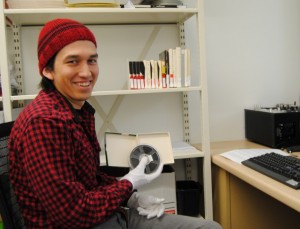I am presented with constant challenges working on language revitalization. The language of my people is considered critically endangered. I have few people that I can regularly go sit with to hear the beauty, rhythm, or “song” of the language. A language is more than a set of grammatical rules – it has a song, a flow, a cadence. It’s the accent and tone. With so few options to hear, or become immersed in my language, the recordings of our elders have become invaluable.
Reel-to-reel technology was once a primary tool for recording First Nations language and oral histories in British Columbia. Now, 60 years after its advent, it has become apparent that this media has a shelf-life – it will someday decay beyond repair. Collections of analog tapes are held by First Nations Communities, organizations and families. If, tapes that may contain the last known recording of a song, or the last unique spoken-word of an endangered language should the reels decay beyond repair this rich cultural content would be lost forever.
Digitization of open reel media from the MOA Archives is the work I have been doing as the Digitization Intern here. Digitization is transferring analog media (things like audio reels or cassettes) to become digital media (like wave or mp3 files). In my work I’ve uncovered recordings of traditional singing by elders, language interviews, and oral histories containing legends and stories. The recordings also includes lectures, interviews and talks with noted anthropologists, artists, and people who had been involved with UBC and MOA (Wayne Suttles, Audrey Hawthorn, Bill Reid, Homer Barnett, etc.)
The MOA Centre for Cultural Research and The First Nations Technology Council received funding from the Irving K. Barber Learning Centre at UBC and the National Archival Development Program to create a “First Nations Digitization Toolkit”. At MOA, we have been developing a portable digitization system for First Nations communities. This system will assist them in preserving and digitizing their own valuable oral histories and language recordings.
Indigenous languages are in a critical state. Numerous academics have worked with elders and community members to document and preserve oral history. These recordings hold the voices of elders who may have been born prior to 1900, and possibly knew people born just after the 18th century. (For most of the British Columbia coast, contact occurred around the 1770’s). Community members, cultural leaders, and other researchers need to have access to the knowledge and history preserved on these recordings.
This project addresses the need to support researchers to access recorded oral histories such as . interviews with elders, language recordings, and traditional songs. These recordings carry valuable information and histories about our ancestors. Through digitization they can be preserved and accessed by researchers and community members for generations to come. We want to ensure our history and knowledge can be passed on, and we thank our ancestors for the foresight to see the importance in documenting and preserving our rich history and culture.
This post originally appeared on the MOA Blog. To view the Original post visit http://www.moa.ubc.ca/blog/?p=2404
